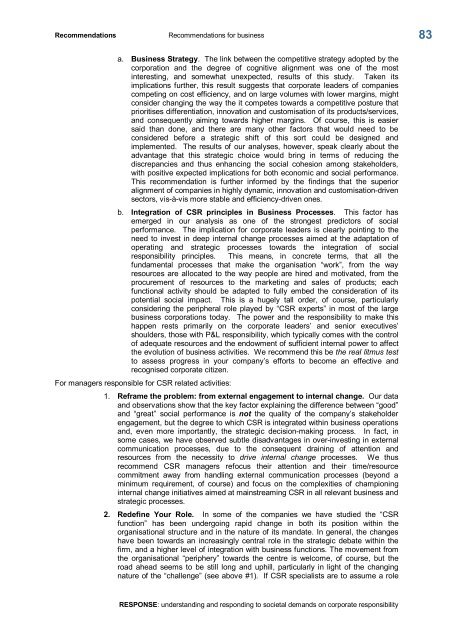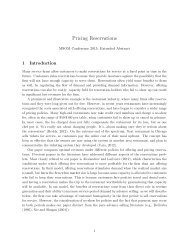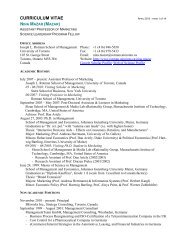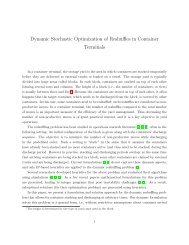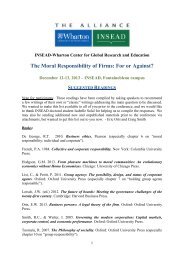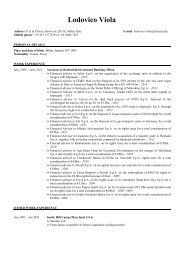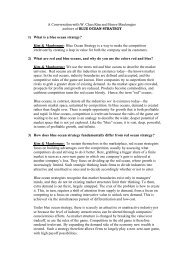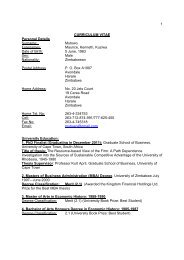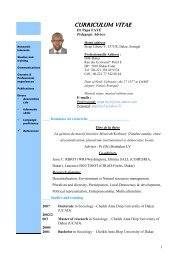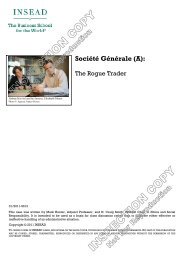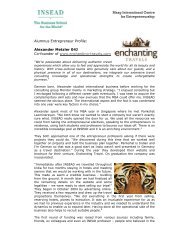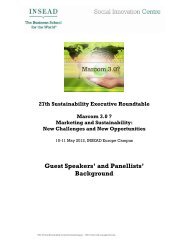RESPONSE - Insead
RESPONSE - Insead
RESPONSE - Insead
Create successful ePaper yourself
Turn your PDF publications into a flip-book with our unique Google optimized e-Paper software.
Recommendations Recommendations for business<br />
a. Business Strategy. The link between the competitive strategy adopted by the<br />
corporation and the degree of cognitive alignment was one of the most<br />
interesting, and somewhat unexpected, results of this study. Taken its<br />
implications further, this result suggests that corporate leaders of companies<br />
competing on cost efficiency, and on large volumes with lower margins, might<br />
consider changing the way the it competes towards a competitive posture that<br />
prioritises differentiation, innovation and customisation of its products/services,<br />
and consequently aiming towards higher margins. Of course, this is easier<br />
said than done, and there are many other factors that would need to be<br />
considered before a strategic shift of this sort could be designed and<br />
implemented. The results of our analyses, however, speak clearly about the<br />
advantage that this strategic choice would bring in terms of reducing the<br />
discrepancies and thus enhancing the social cohesion among stakeholders,<br />
with positive expected implications for both economic and social performance.<br />
This recommendation is further informed by the findings that the superior<br />
alignment of companies in highly dynamic, innovation and customisationdriven<br />
sectors, visàvis more stable and efficiencydriven ones.<br />
b. Integration of CSR principles in Business Processes. This factor has<br />
emerged in our analysis as one of the strongest predictors of social<br />
performance. The implication for corporate leaders is clearly pointing to the<br />
need to invest in deep internal change processes aimed at the adaptation of<br />
operating and strategic processes towards the integration of social<br />
responsibility principles. This means, in concrete terms, that all the<br />
fundamental processes that make the organisation “work”, from the way<br />
resources are allocated to the way people are hired and motivated, from the<br />
procurement of resources to the marketing and sales of products; each<br />
functional activity should be adapted to fully embed the consideration of its<br />
potential social impact. This is a hugely tall order, of course, particularly<br />
considering the peripheral role played by “CSR experts” in most of the large<br />
business corporations today. The power and the responsibility to make this<br />
happen rests primarily on the corporate leaders’ and senior executives’<br />
shoulders, those with P&L responsibility, which typically comes with the control<br />
of adequate resources and the endowment of sufficient internal power to affect<br />
the evolution of business activities. We recommend this be the real litmus test<br />
to assess progress in your company’s efforts to become an effective and<br />
recognised corporate citizen.<br />
For managers responsible for CSR related activities:<br />
1. Reframe the problem: from external engagement to internal change. Our data<br />
and observations show that the key factor explaining the difference between “good”<br />
and “great” social performance is not the quality of the company’s stakeholder<br />
engagement, but the degree to which CSR is integrated within business operations<br />
and, even more importantly, the strategic decisionmaking process. In fact, in<br />
some cases, we have observed subtle disadvantages in overinvesting in external<br />
communication processes, due to the consequent draining of attention and<br />
resources from the necessity to drive internal change processes. We thus<br />
recommend CSR managers refocus their attention and their time/resource<br />
commitment away from handling external communication processes (beyond a<br />
minimum requirement, of course) and focus on the complexities of championing<br />
internal change initiatives aimed at mainstreaming CSR in all relevant business and<br />
strategic processes.<br />
2. Redefine Your Role. In some of the companies we have studied the “CSR<br />
function” has been undergoing rapid change in both its position within the<br />
organisational structure and in the nature of its mandate. In general, the changes<br />
have been towards an increasingly central role in the strategic debate within the<br />
firm, and a higher level of integration with business functions. The movement from<br />
the organisational “periphery” towards the centre is welcome, of course, but the<br />
road ahead seems to be still long and uphill, particularly in light of the changing<br />
nature of the “challenge” (see above #1). If CSR specialists are to assume a role<br />
<strong>RESPONSE</strong>: understanding and responding to societal demands on corporate responsibility<br />
83


